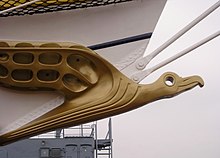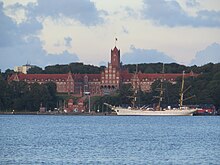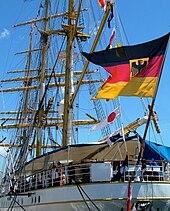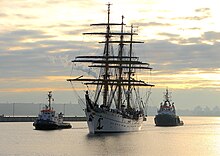
| |
| History | |
|---|---|
| Name | Gorch Fock II |
| Namesake | Johann Kinau, AKA "Gorch Fock" |
| Owner | German Navy (Deutsche Marine) |
| Builder | Blohm & Voss |
| Yard number | 804 |
| Launched | 23 August 1958 |
| Commissioned | 17 December 1958 |
| Homeport | Kiel |
| Identification |
|
| Status | In active service, as of 2014 |
| General characteristics | |
| Class and type | Type 441 training ship |
| Displacement | 1760 tons |
| Length | 81.2 m (266 ft) |
| Beam | 12 m (39 ft) |
| Draught | 5.2 m (17 ft) |
| Installed power | 1,220 kW (1660 hp) |
| Propulsion | Sail, auxiliary six-cylinder diesel engine |
| Sail plan | three-masted barque |
| Speed | 13.7 knots (25.4 km/h; 15.8 mph) under power |
The Gorch Fock is a tall ship of the German Navy (Deutsche Marine), built in 1958 as a replacement for the original Gorch Fock built in 1933 which was taken as war reparations by the Soviet Union after World War II, renamed Tovarishch, and returned to Germany in 2003.
Both ships are named in honour of the German writer Johann Kinau who wrote under the pseudonym "Gorch Fock" and died in the battle of Jutland/Skagerrak in 1916. The modern-day Gorch Fock was built in 1958 as a delayed sister ship to five ships built in the 1930s, and has since then undertaken 146 cruises (as of October 2006), including one tour around the world in 1988. She is sometimes referred to (unofficially) as the Gorch Fock II to distinguish her from her older sister ship. The Gorch Fock is under the command of the Naval Academy in Flensburg-Mürwik.
The ship


Germany lost all of its school ships as war reparations after World War II to the Allies, so the West German Bundesmarine decided in 1957 to have a new training vessel built following the plans for the original Gorch Fock of 1933 which by that time was owned by the Soviets, and renamed to Tovarishch. The new ship was a modernized repeat of the Albert Leo Schlageter, a slightly modified sister ship of the previous Gorch Fock.
The 1933 Gorch Fock had already been designed to be a very safe ship: she had a righting moment large enough to bring her back into the upright position even when heeling over to nearly 90°. Nevertheless some last-minute changes to the design were made in response to the Pamir disaster in 1957, especially concerning the strength of the body and the bulkheads as well as the lifesaving equipment, including the lifeboats.
The new ship was built by Blohm & Voss in Hamburg, launched on 23 August 1958, and commissioned on 17 December of that year. Her home port is Kiel. The Gorch Fock is a three-masted barque with a steel hull 81.2 m (266 ft) long (without the bowsprit) and 12 m (40 ft) wide. She has a draught of some 5.2 m (17 ft) and a displacement at full load of 1760 tons. Originally, she carried 1,952 m (21,010 sq ft) of canvas sails; later, she received slightly larger sails made of synthetic materials. The tops of her fore and main masts can be lowered so that she can navigate the Kiel Canal, otherwise she would be too tall for some of the bridges spanning the canal. Officially Gorch Fock is a Type 441 class naval ship with the NATO pennant number A60. Her international radio call sign is DRAX.
Renovations and repair problems
Over the years, various modernizations have been applied to the ship. She was fitted with air conditioning, the asbestos used originally was removed and replaced by less dangerous materials in 1991, and in that year she also received a new auxiliary engine, a six cylinder diesel engine producing 1,220 kW (1660 hp), giving the ship a top speed of 13.7 knots (25.4 km/h; 15.8 mph) under power. The interior has also been modified multiple times; technological advances made it possible to reduce the size of the galley and enlarge the crew quarters.
In November 2015 the ship was brought to the German shipyard Elsflether Werft at Bremerhaven because of hull problems with a first cost estimate of 9.6 million euro. With the discovery of more problems the estimate was stepwise raised to 64.5 million euro within a year. Despite concerns about the rising costs the Ministry of Defense approved a continuation of the repairs. In 2017 it was determined that the amount of work required was much greater; this included the almost complete replacement of the hull plating, renewal of decks and refurbishment of the engine with a cost estimated at 135 million euro. In January 2018 repairs were stopped while a review was carried out by the Ministry of Defence, including consideration of replacing Gorch Fock with a new vessel. In March 2018 it was announced that the project would continue, noting that a new vessel could not be delivered until 2025, and that the existing vessel would re-enter service in 2019. However, in January 2019 the ship was reported to be in a "completely dismantled" state. A review by the Bundesrechnungshof (Federal Audit Office) was sharply critical of the procurement process by the Ministry of Defense. Also, at the end of January 2019, the executive board and the board of directors of the shipyard were released of their duty.
While the Gorch Fock is under repair the Romanian sister ship Mircea has been used for training.
On 1 September 2021 the Gorch Fock took to sea for the first time in six years for its first trial run after its extensive renovations.
On 30 September 2021 the Gorch Fock will be returned to the German navy.
The figurehead

The ship's figurehead was designed by Heinrich Schroeteler, a former World War II U-boat commander. The figurehead has been replaced on several occasions:
- The first albatross from 1958 was lost after a few years; its replacement was made of wood, like the original.
- In 1969, the replacement was removed and replaced by a figurehead made of polyester to save weight.
- This albatross broke off when the Gorch Fock was being overhauled in 2000. It was replaced by a new one made of wood.
- On 11 December 2002, the Gorch Fock figurehead was lost in a storm. The replacement was also made of wood.
- Again, the figurehead broke off in a storm on 5 December 2003. On 24 February 2004, the ship was fitted with a new albatross, this time made of carbon fibre reinforced polyester.
The cruises



The Gorch Fock has been in German Navy service as a training ship since 1958. Since she has been commissioned, more than 14,500 cadets have been trained on the Gorch Fock. The Gorch Fock participates in sailing parades and Tall Ships' Races, where she is in amicable rivalry with the Italian vessel Amerigo Vespucci. Other ships of the same class include the USCGC Eagle, Sagres, Gorch Fock (1933) and Mircea. The Gorch Fock can host up to 350 passengers on board.
In 1987–88, she sailed around the world, with stopovers on five continents. Lasting 336 days, this was her second longest cruise, topped only by a training cruise in 1996–97 from Kiel to Bangkok and back that lasted 343 days.
At least six sailors have died in accidents aboard the Gorch Fock, either by falling from the rigging or by going overboard. Recent fatalities include an 18-year-old officer-candidate who went overboard at night in the North Sea on 3 September 2008. On 7 November 2010, an officer-candidate perished when she fell from the rigging. The accident happened during an exercise while the ship was moored in the port of Salvador da Bahia (Brazil).
In the aftermath of the latest accident, naval cadets refused to climb the rigging (the highest position on the main mast being 45 metres or 148 feet), and four of them were subsequently accused of "inciting rebellion". This was described as a mutiny in some accounts. Subsequently, officers' training on board the Gorch Fock was suspended, pending a thorough review of training protocols as well as the entire training program. According to a 19 November 2010 statement issued by the German Fleet Command, the officer candidates then on board were to be flown back to Germany to continue their training while the ship was docked in Ushuaia, Argentina. The commanding officer was suspended, and a commission was appointed to investigate claims of sexual harassment and improper conduct. On 13 March 2011, all charges against the commanding officer were dismissed.
References
- ^ Matthias Gebauer (January 13, 2019). "Von der Leyen und das "Gorch Fock"-Debakel" (in German). Der Spiegel. Retrieved January 13, 2019.
- Federal Ministry of Defense (BMVg) (January 26, 2017). "Von der Leyen: "Gorch Fock soll weitersegeln"". BMVg. Archived from the original on December 20, 2018. Retrieved January 13, 2019.
- ^ Christoph Prössl (20 March 2018). "135 Millionen Euro für ein Stück Tradition". Tagesschau.de (in German). Hamburg: ARD-aktuell. Retrieved 20 March 2018.
- ""Gorch Fock" soll für bis zu 135 Millionen Euro saniert werden". Stern (in German). Hamburg: Gruner + Jahr. 20 March 2018. Retrieved 20 March 2018.
- Vorstand entlassen, Der Spiegel, January 30, 2019
- "Sanierte "Gorch Fock" schippert über die Weser zur Nordsee". Norddeutscher Rundfunk (in German). 2021-09-01. Retrieved 2021-09-01.
- ""Gorch Fock" wird am 30. September an die Marine übergeben" (in German). Oldenburg: Norddeutscher Rundfunk. 8 June 2021. Retrieved 18 July 2021.
- ^ "Statistiken" (in German). German Navy. 25 August 2008.
- ^ "Woman sailor dies in Gorch Fock training accident"
- ^ "Germany investigates alleged Gorch Fock Mutiny"
- "BBC News - Gorch Fock case: German navy cadets 'mistreated'". 25 January 2011. Retrieved 2011-01-25.
- "Investigators clear Gorch Fock commander of allegations" The Local, 13 March 2011
External links
- Official homepage of the Gorch Fock at the German Navy web site. In German. Google translation
- ESYS - unofficial home page; in German. Google translation
- Gorch Fock Homepage Another Gorch Fock home page in German.
- English website of the Gorch Fock
| Ship classes of the German Navy | |
|---|---|
| Destroyers | |
| Frigates | |
| Corvettes | |
| Fast attack craft | |
| Gunboats | |
| Mine warfare | |
| Submarines | |
| Training ships | |
| Auxiliary ships | |
| Blohm+Voss | |
|---|---|
| Warships of World War I | |
| Warships of World War II | |
| Tall ships | |
| Ocean liners and other passenger ships | |
| Private yachts | |
| Modern ships | |
| Related | |